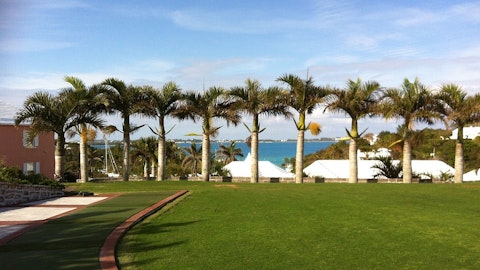Wheaton Precious Metals Corp. (NYSE:WPM) Q2 2024 Earnings Call Transcript August 8, 2024
Operator: Good morning, ladies and gentlemen. Thank you for standing by. Welcome to the Wheaton Precious Metals’ 2024 Second Quarter Results Conference Call. All lines have been placed on mute to prevent any background noise. After the speaker’s remarks there will be a question-and-answer session. [Operator Instructions]. Thank you. I would like to remind everyone that this conference call is being recorded on Thursday, August 8, 2024 at 8:00 AM Eastern Time. I will now turn the conference over to Emma Murray, Vice President of Investor Relations. Please go ahead.
Emma Murray: Thank you, operator. Good morning, ladies and gentlemen, and thank you for participating in today’s call. I’m joined today by Randy Smallwood, Wheaton Precious Metals’ President and Chief Executive Officer; Gary Brown, Senior Vice President and Chief Financial Officer; Haytham Hodaly, Senior Vice President, Corporate Development; and Wes Carson, Vice President, Mining Operations. Please note that, for those not currently on the webcast, a slide presentation accompanying this conference call is available in PDF format on the Presentations page of our website. Some of the commentary on today’s call may contain forward-looking statements and I would direct everyone to review Slide 2 of the presentation, which contains important cautionary notes regarding forward-looking statements.
It should be noted that all figures referred to on today’s call are in U.S. dollars unless otherwise noted. With that, I’d like to turn the call over to Randy Smallwood, our President and Chief Executive Officer.
Randy Smallwood: Thank you, Emma and good morning, everyone. Thank you for joining us today to discuss Wheaton’s second quarter results of 2024. I am pleased to announce that our portfolio of long life, low cost assets has delivered another solid quarter, generating $234 million in operating cash flows, resulting in record cash flows of over $450 million for the first half of this year. This performance underscores the effectiveness of our business model in leveraging rising commodity prices while maintaining strong margins. The company has produced over 305,000 gold equivalent ounces year-to-date, and we are well on track to achieve our 2024 production guidance of 550,000 to 620,000 gold equivalent ounces. The company also remains very liquid with $540 million in cash at our quarter end and a $2 billion undrawn revolving credit facility, which, when coupled with the strength of our forecasted operating cash flows, provides strong flexibility to fund all outstanding commitments as well as the capacity to acquire additional accretive mineral stream interests.
Our corporate development team remains actively engaged in evaluating new opportunities, and we continue to see a healthy appetite for streaming as a source of capital for the mining industry. In addition, during the quarter, we published our annual Sustainability and Climate Change reports, and we are proud to have been ranked among the top ten in Corporate Knights 50 Best Corporate Citizens in Canada for 2024. As the founders and architects of sustainable streaming this accomplishment is reflective of our commitment to operating responsibly in all facets of our business. Our performance in the first half of 2024 supports our belief that the strength of our organic growth profile, combined with favorable commodity price trends, firmly positions Wheaton as the premier choice for high quality, long life precious metals exposure.
With that, I would like to turn the call over to Wes Carson, our Vice President of Operations, who will provide more details on our operating results. Wes.
Wes Carson: Thanks, Randy and good morning. Overall production in the second quarter came in higher than expected, driven by strong outperformances at Salobo, Peñasquito, and Antamina. In the second quarter of 2024, Salobo produced 63,200 ounces attributable gold, an increase of approximately 23% relative to the second quarter of 2023, driven primarily by higher throughput. Salobo’s strong production in Q2 is attributable primarily to the continued ramp up of Salobo 3 expansion and sustained overall improvements at both Salobo 1 and 2. On June 17th, Vale reported a conveyor fire at Salobo 3 and on July 25th they announced that plant operations at Salobo 3 had resumed after 31 days repair period. Vale has maintained their copper guidance for the year, and we anticipate that any impacts to Wheaton’s guidance will be minimal and offset by outperformance in the first half of the year.
In the second quarter of 2024, Constancia produced 450,000 ounces of attributable silver and 6100 ounces of attributable gold, an increase of approximately 7% and a decrease of 18%, respectively, relative to the second quarter of 2023. The decrease in gold production was primarily the result of lower grades due to planned stripping activity in the Pampacancha pit, which commenced in the second quarter and is expected to continue through the third quarter of 2024. Hudbay has reported that mill ore feed has now reverted to the typical blend of approximately one third of Pampacancha and two thirds from Constancia, which is expected to continue throughout 2024. In the second quarter of 2024, Peñasquito produced 2.3 million ounces of attributable silver, an increase of approximately 30% relative to the second quarter of 2023, primarily due to higher throughput, partially offset by slightly lower grades.
Production in the second quarter continued to focus on mining in the Chile, Colorado pit, which contains higher silver, lead and zinc metal, and silver grades than the main Penasco pit. Grades are expected to decrease slightly in the back half of the year as mining moves back into the Penasco pits. On July 31st, 2024, Ivanhoe reported that construction of Platreef’s Phase 1 concentrator was completed on schedule subsequent to the quarter. Cold commissioning has started with water being fed through the concentrator and construction of Platreef Shaft 2 headgear at approximately 60% complete. An updated independent feasibility study on an optimized development plan for the acceleration of Phase 2 is planned to be completed and published in the fourth quarter of 2024.

In addition, a preliminary economic assessment on the Phase 3 expansion is expected to be completed at the same time, with the expansion forecast to increase Platreef’s processing capacity up to approximately 10 million tons per annum. A Phase 3 expansion to 10 million tons processing capacity is expected to rank Platreef as one of the world’s largest platinum group metals, nickel, copper and gold producers. As mentioned by Randy, with over 305,000 ounce produced year-to-date, the company remains well on track to achieve our annual production guidance this year. Means estimated attributable production in 2024 continues to be forecast at 325,000 to 370,000 ounces of gold, 18.5 million to 20.5 million ounces of silver, and 12,000 to 15,000 ounces of our GEOs of other metals, resulting in an overall production of approximately 550,000 to 620,000 GEOs. Production is forecast to increase at an industry leading rate of approximately 40% to over 800,000 ounce by 2028, primarily due to growth from operating assets including Salobo, Antamina, Peñasquito, Voisey’s Bay, and Marmato, development projects, which are in construction and or permitted, including Blackwater, Platreef, Goose, Mineral Park, Fenix, Curipamba, Santo Domingo, and pre-development projects including Marathon and Copper World, from which production is anticipated towards the latter end of the five year forecast period.
From 2029 to 2033, attributable production is forecast to average over 850,000 ounces of gold globe analysis annually for the five-year period. And that concludes the operational overview. And with that, I will turn the call over to Gary.
Gary Brown: Thank you Wes. As described by Wes, production in the second quarter amounted to 147,000 GEOs, a 7% increase relative to the comparable period of the prior year, with higher production from Salobo, Zinkgruvan, and Peñasquito being offset by lower production from San Dimas and Constancia combined with the cessation of production from Aljustrel and Minto. Sales volumes amounted to 124,000 GEOs, a 4% decrease relative to the comparable period of the prior year, primarily due to timing of sales resulting from the relative changes in ounces produced but not yet delivered, or PBND, which resulted in a reduction in sales volumes relative to Q2 2023 of over 23,000 GEOs. Strong commodity prices, coupled with our solid production base, resulted in revenue increasing by 13% to $299 million relative to Q2 2023.
Of this revenue, 61% was attributable to gold, 37% to silver, 1% to Palladium, and 1% to Cobalt. As at June 30, 2024 approximately 128,000 GEOs were in PBND, representing approximately 2.9 months of table production. A slight increase from the preceding four quarters, due to relative differences in timing of sales, but within our guided range of two to three months. G&A expenses amounted to $10 million for the second quarter, and the company continues to anticipate that G&A will total $41 million to $45 million for the year, with these figures excluding share-based compensation, as well as donations and community investments. On June 20, 2024, Canada’s Global Minimum Tax Act, or GMTA, received royal assent and as such the income from our Cayman’s Island subsidiaries will be subject to a 15% minimum tax.
As we previously messaged, as the Global Minimum Tax is retroactive to January 1, 2024, the company has recorded two quarters worth of Global Minimum Tax, amounting to $51 million in its financial statements for the period ending June 30, 2024, with $25 million relating to Q1 2024. Going forward, the quarterly tax expense associated with GMT will be recognized in our consolidated financial statements in the appropriate reporting period. Removing the GMT associated with the Q1 2024 earnings and other smaller items, adjusted net earnings amounted to $150 million, with the $7 million increase from the prior year, due primarily to the higher gross margin, partially offset by the higher income tax expense relative to the Global Minimum Tax. I believe it is worth pausing here to emphasize that we were able to generate higher adjusted earnings, despite the implementation of a 15% Global Minimum Tax.
Quite remarkable. Wheaton continued to deliver robust cash operating margins in the second quarter, resulting in cash flow from operations of $234 million, with a $32 million increase from the prior year, due primarily to higher gross margins. As mentioned by Randy, the strength of our second quarter cash flows resulted in cash flows for the first half of the year of over $450 million, representing a new record for Wheaton. Lastly, we declared a quarterly dividend of $0.155 per share, a 3% increase from the prior year. During the quarter, Wheaton made total upfront cash payments of approximately $45 million, $25 million of which was relative to the Mineral Park Stream, and $10 million of which was relative to the Cangrejos stream, with the remaining $10 million relating to the Mt. Todd royalty.
Additionally, the company made two dividend payments, totaling $139 million, and disposed of its investment in Hecla Mining Company, for gross proceeds of $177 million. When coupled with cash generated from operating activities, our overall net cash inflows amounted to $234 million in the second quarter of 2024, resulting in cash and cash equivalents at June 30th of $540 million. We believe this cash balance combined with the strength of our forecasted operating cash flows and the fully undrawn $2 billion revolving credit facility, which was recently extended by an additional year, positions the company exceptionally well to satisfy its funding commitments and provides us with financial flexibility to acquire additional accretive mineral stream interests.
That concludes the financial summary and with that, I will turn the call back over to Randy.
Randy Smallwood: Thank you, Gary. In closing, we believe Wheaton is well positioned to continue delivering value to all of our stakeholders for a number of different reasons. Firstly, by offering our shareholders exposure to our diversified portfolio, long-life low-cost assets, that we believe has one of the best organic growth profiles in the entire mining industry. Secondly, by continuing to generate strong operating cash flows and maintaining low predictable costs, which when coupled with our leverage to increase commodity prices, result in some of the highest margins in the precious metal space. Thirdly, a pipeline of significantly de-risked development projects which further supports our impressive organic growth profile of over 40% by 2028. And lastly, our commitment to sustainability and supporting our partners and the communities in which we live and operate. So with that, I would like to open the call up for questions, Operator.
Q&A Session
Follow Wheaton Precious Metals Corp. (NYSE:WPM)
Follow Wheaton Precious Metals Corp. (NYSE:WPM)
Receive real-time insider trading and news alerts
Operator: Thank you, and ladies and gentlemen, we will now begin the question-and-answer session. [Operator Instructions]. And your first question comes from the line of a Richard Hatch with Berenberg. Please go ahead.
Richard Hatch: Thanks very much. Yeah, good morning Randy and team. And thanks for the call. Just wondering if you might help us a bit with Salobo, clearly a better quarter which is really good to see. But just wondering if you might be able to help us a bit as really kind to 2025, 2026, you able to give us broad expectations of grade and such like, I know it’s one that’s kind of sometimes a bit challenging, but any kind of color that would be super helpful? That’s the first one.
Randy Smallwood: I’ll let Wes take that one.
Wes Carson: Yeah, perfect. Thanks for the question, Richard. So we are starting to see a slight drop off in grades over the next couple of years, so into 2025, 2026. But with that we’re also seeing that the ramp up of Salobo 3 and really an increase in throughput there. So over the next few years, we do expect a slight increase in production and we’ll see that continue really as Salobo 3 really comes online and comes together. So, for the rest of this year, I mean, we see that kind of flattening of the production and then as the throughput comes up, Salobo 3 will see a better year next year, I think and into the next couple of years.
Richard Hatch: That’s really helpful. Thanks. And then just on the business development kind of piece, perhaps for Randy and Haytham, can you just talk a bit about what kind of deals you’re seeing at the moment, it feels like the diversified has got strong balance sheets, not necessarily looking for large sort of ticket transactions at this point, but maybe as we go into the next sort of copper cycle, that opportunity might present itself, but just as you’re looking down the list of your current BD opportunities, are we still kind of mainly focusing on these gold producers and such like in the midst of a few hundred million dollar ranges or are we seeing something a bit more large scale than such will be helpful? Thanks.
Randy Smallwood: Well, I will let Haytham answer that one.
Haytham Hodaly: Thanks for the question, Richard. Quite simply we’ve got a number of opportunities that we’re actually advancing through the due diligence phase right now. I would say development stage funding is still the focus, although we are seeing a resurgence in some balance sheet strengthening opportunities. The majority of the opportunities we’re seeing is probably 50:50 between probably metallic opportunities, which have a precious metal byproduct and actually precious metals companies that have very, very strong margins that are looking for continued growth. So it’s a very robust market. I would say the majority of the opportunities fall somewhere between a $100 million to $700 million, in that range with a couple of those being north of $500 million.
Randy Smallwood: Yeah, I would say just to add to that, the deal size, the opportunity size seems to be a little bit bigger than what we’ve seen in say the last year. There seems to be a little bit more of an appetite and a lot of these projects are actually a lot closer to the production, the construction stage and production. So, I think overall it actually looks a little bit healthier, but it’s still very busy on that front.
Richard Hatch: Okay, very helpful. Thanks a lot for your time.
Randy Smallwood: Thank you, Richard.
Operator: And your next question comes from the line up Martin Pradier with Veritas Investment Research. Please go ahead.
Martin Pradier: Thank you. If gold production in second half is similar to first half, you would hit at least the middle of your guidance range for gold and exceed the upper end of the guidance or silver. So, the question is, is gold production expected to be weaker or stronger in the second half versus the first half, and in terms of silver production, if you expect a weaker second half versus first half?
Randy Smallwood: I will let Wes add some color there.
Wes Carson: Sure, so right now, Martin, we’re looking at probably a split of about 52% in the first half of the year and 48% in the second half of the year on an overall basis. We are expecting a weakening in the gold production at Salobo with some of the impacts from the fire and really just a lower grade, particularly in the fourth quarter. And then we are, as mentioned, on Peñasquito on the silver side, seeing that drop as they move back into the Penasco pit. So, overall, as we said about that 52:48 is about what we’re expecting for the rest of this year.
Martin Pradier: Okay, great. And in terms of Salobo, is the impact of the fire expected to be around 10,000 ounces in terms of production?
Wes Carson: It will be in that range. I would say we’re hoping lower than that, certainly, because they did get things back up and running fairly quickly. It wasn’t one of the major conveyors and really just affected the third line. So Salobo 1 and 2 were running through that period. And also during that period, they had some planned maintenance shutdowns during that period as well. So we haven’t seen the full results of it yet, but that’s in the range, hopefully slightly better than that.
Randy Smallwood: Yeah, I think it might be worth talking about the fact that Salobo outperformed a bit in the first half of this year. And I think that fire probably consumed up some of that outperformance. And so from an overall annual basis, it’s probably net neutral. But that outperformance, as I said, was probably eaten up a little bit by the impact of the fire.
Martin Pradier: Great. Thank you.
Operator: [Operator Instructions]. Your next question comes from the line of Tanya Jakusconek with Scotiabank. Please go ahead.
Tanya Jakusconek: Oh, good. It’s me. Thank you. Good morning, everyone. Just wanted to come back just on the guidance. Thank you for the 52:48. But with all these little moving carts in the second half, just want to confirm, I think previously, we were looking for fairly even Q3 equal to Q4 should that — is that something how we should be thinking about given the fire and some of the other great movement?
Randy Smallwood: Go ahead, Wes.
Wes Carson: Yeah, I would say that that is correct. It will be fairly even. I mean, there’s a lot of moving parts as you say, between the quarters there. But it is fairly even between Q3 and Q4.
Randy Smallwood: I think the impacts of the fire are going Q3 and then we have definitely lower grade scheduled into Q4. And so it’s probably going to spread it pretty evenly there at Salobo.
Tanya Jakusconek: Okay, well thank you for that. And I just wanted to ask Gary the DDNA forecast for the year. Usually we get that in August in terms of depreciation. And sorry, maybe in your information provided there, we just had a number of companies report last night?
Randy Smallwood: Sorry. The question was with respect to what we expect G&A to be.
Tanya Jakusconek: No, depreciation. DD&A, depreciation.
Randy Smallwood: Yeah. I mean, Tanya, we provide asset by asset depletion numbers in the MD&A. I would suggest looking at what we depleted for Q2 as an indication of what our per ounce depletion will be by asset.
Tanya Jakusconek: Okay, alright. So Q2 is a benchmark going forward. Thank you for that. And then can I just ask Haytham, just coming back to you on these transactions and opportunities that are out there and interesting that we have the 100 million to 700 million and a couple over 500 million. And you mentioned then sort of the development stage or early construction. How does Platinum Palladium fit it right now given their weak prices, are those opportunities you’re looking at in addition to the gold side, gold silver?
Haytham Hodaly: I would say even on — you are right, the PGM’s given where PGM price has gone, there’s probably a few opportunities in there that we’re also looking at. I would say that we’re still looking at the gold components of the PGM typically. If we’re looking at anything else outside of the gold may be its platinum and only to top up if they need more capital than the gold could provide them. But we’re seeing not just the PGM opportunities, but obviously we’re seeing some gold opportunities with people trying to capitalize on the strong commodity price to try and get some additional funding.
Tanya Jakusconek: Okay, that’s helpful. Thank you. And then where would the corporate transactions fit in as you look at the space?
Haytham Hodaly: So we’ll always consider looking at our peers and seeing if and when it makes sense for us to actually make any type of corporate transactions. I will say that at this point in time it doesn’t make sense to pay a premium on a multiple when I can still purchase streams at or below net asset value.
Tanya Jakusconek: Yeah, no, I agree. And just as you look at the environment, I mean, I always hear everyone say that so much of it is so much out there. Maybe just give us an idea from like a timing perspective because it is just that I’ve heard so many comments on this, so many deals out there, like how long does these deals take to actually do, like from the time you actually say, okay, we’re working on something to actually do your due diligence, I know it’s moment by moment, each one has a different time frame, but just so that we can understand from the moment you’re saying you’re seeing so much to actually completing some of these things so that we can kind of understand the process? Thank you.
Haytham Hodaly: Sure, Tanya, I am happy to answer that as well. So generally speaking if an opportunity, depends on whether we’re being proactive or reactive. Most of the time we’re proactive going out there looking at opportunities. Probably, I’d say 20% or 30% of the time. Right now, we’re being reactive to opportunities coming into door. Once an opportunity comes in the door, it takes us usually a couple of weeks to actually do our first pass bolts, just to see if it actually makes sense to put a stream on it. If we do that, and we find that the asset can actually handle, the margins are solid, the asset can handle the stream, we’ll do a deep dive, and that usually takes another couple of weeks. We are somewhere along the way and we’ll put out an indication of value.
We will, assuming the indication of values is interesting to the counterparty, then we’ll head to site. At the same time, we’ll start working on term sheets. And once we typically conclude term sheets, we look for exclusivity. Once that exclusivity is obtained, usually takes about another four weeks to get the defenders [ph] in place. So, you’re talking, we start to finish anywhere from, I’d say six to eight weeks is a typical timeline, first stream.
Tanya Jakusconek: Okay, thank you for that. I actually thought it was longer, but thank you for that.
Randy Smallwood: Sometimes it takes longer, but usually it has to do with database issues and stuff like that, it’s always a matter of having to make sure that we’re getting good information in when we’re assessing these projects, and so sometimes that does drag on a bit.
Tanya Jakusconek: Okay, so about two months would be something that we should kind of think about.
Haytham Hodaly: Yeah, I mean, if you ask our lawyers, they’d rather we set free, but we’ve done it in four weeks, and it’s taken as long as three months, so yeah, it’s probably a good average.
Tanya Jakusconek: Okay, thank you for the color.
Operator: And your next question comes from the line of Ralph Profiti with Eight Capital. Please go ahead.
Ralph Profiti: Thanks, operator. Just one question from me. I did see some rephasing of the Central Domingo upfront payment that came with the updated feasibility study, and I’m just wondering, where does that upfront stream payment rank in sort of the project capital spending, is it sort of [indiscernible] with the project financing, or is it on project sanctioning, just wondering how that works?
Randy Smallwood: That money goes in ahead of debt, and so it’s in the earlier part of the construction phase. You have to commence construction and move forward, but it does go into the ground before any project debt gets applied to it.
Haytham Hodaly: No, that being said, we have to make sure that they have to ensure that the full funding package is in place in a range before we would actually buy any capital.
Ralph Profiti: Understood. Got you. Thanks for that. Appreciate it. Thanks, Randy. Thanks, Haytham.
Randy Smallwood: Well, thank you everyone for your time today. We are pleased to have reported a strong first half of the year. We filed [ph] quality portfolio of assets, sector-leading growth profile, and commitment to sustainability, provides all of our shareholders, all of our stakeholders with a solid outlook for the future, and what we believe to be one of the best vehicles for investing into the gold and precious metal space. And as we celebrate our 20th anniversary, throughout 2024, I am sincerely thankful to all of our stakeholders for being part of Wheaton’s success. And I look forward to a golden future together. We look forward to speaking with you all again soon. Thank you.
Operator: Thank you, presenters. And this concludes this conference call for today. Thank you for participating. Please disconnect your lines.
Follow Wheaton Precious Metals Corp. (NYSE:WPM)
Follow Wheaton Precious Metals Corp. (NYSE:WPM)
Receive real-time insider trading and news alerts





